Software has become an essential tool for small businesses. Whether it’s streamlining operations, managing finances, or enhancing customer relationships, the right software can make all the difference.
In this article, we’ll explore the importance of software for small businesses and review the top software categories to help you choose the right tools for your company. We’ll also provide insights on implementing software and discuss future trends that can shape the way small businesses operate.
Understanding the Importance of Software for Small Businesses

Running a small business requires efficient and effective operations. This is where software comes into play. It enables businesses to automate processes, improve productivity, and make data-driven decisions. From managing inventory and tracking sales to analyzing customer behavior, software empowers small businesses to compete in today’s competitive market.
Let’s dive deeper into the role of software in business operations. Software plays a crucial role in simplifying and streamlining business operations.
It helps automate repetitive tasks, freeing up valuable time for entrepreneurs or employees to focus on strategic initiatives. Whether it’s managing inventory, processing orders, or scheduling appointments, software can handle these tasks efficiently, reducing manual errors and improving overall efficiency.
But what key features should you look for when selecting small business accounting software for your small business? It’s important to consider the specific needs of your business. Look for software that offers customizable solutions, scalability, and integration capabilities.
Customizable solutions allow you to tailor the software to fit your business processes, ensuring a seamless integration into your existing workflow. Scalability is also crucial, as your business grows, you want software that can grow with you, accommodating increased data and user demands.
In addition to customization and scalability, features such as reporting and analytics can greatly enhance your business operations. The ability to generate reports and analyze data gives you valuable insights into your business performance, allowing you to make informed decisions and identify areas for improvement.
Mobile accessibility is another important feature to consider. With the rise of remote work and on-the-go business operations, having software that can be accessed from mobile devices ensures that you can stay connected and manage your business from anywhere.
User-friendly interfaces are also worth considering. Intuitive and easy-to-use software interfaces make it easier for employees to adopt and utilize the software effectively, reducing the learning curve and increasing productivity.
Additionally, integration capabilities are essential. Look for software that can integrate with other tools and systems you use, such as accounting software or customer relationship management (CRM) systems. Seamless integration allows for smooth data flow and eliminates the need for manual data entry or duplicate records.
Software plays a vital role in the success of small businesses. It streamlines operations, automates tasks, and provides valuable insights through reporting and analytics. When selecting software for your small business, consider features such as customization, scalability, reporting and analytics, mobile accessibility, user-friendly interfaces, and integration capabilities.
By choosing the right software, you can optimize your small business tools and operations and stay competitive in today’s fast-paced market.
Reviewing Top Business Software Categories
Now that we understand the importance of software, let’s dive into the top business software categories that can benefit small businesses.
Accounting and Finance Software
Managing finances is a critical aspect of any business. Accounting and finance software can simplify tasks such as invoicing, using bookkeeping software, and financial reporting. With the right software, you can automate expense tracking, ensuring that every transaction is accurately recorded. Additionally, seamless integration with banking systems allows for easy reconciliation of accounts, saving you time and effort.
Accurate financial statements are crucial for making informed business decisions. Look for software that can generate these statements with ease, providing you with a clear overview of your company’s financial health. With the ability to analyze your financial data, you can identify trends, make adjustments, and plan for the future.
Customer Relationship Management (CRM) Software
Effective customer relationship management is essential for small business success. CRM software helps streamline sales, marketing, and customer service activities. With contact management features, you can keep track of all your interactions with customers, ensuring that no opportunity is missed.
Lead tracking capabilities allow you to monitor the progress of potential customers through the sales pipeline. By understanding where each lead stands, you can tailor your approach and increase your chances of closing deals. Integration with email systems enables seamless communication with your customers, ensuring that you stay connected and responsive.
Analytics play a crucial role in understanding customer behavior and preferences. Look for CRM software that provides detailed insights into your customer interactions. By analyzing this data, you can identify patterns, personalize your marketing efforts, and build long-lasting relationships with your customers.
Project Management Software
Keeping projects on track is crucial for small businesses. Project management software allows you to plan, organize, and collaborate on tasks, ensuring projects are completed within budget and deadlines. With task management features, you can assign responsibilities, set deadlines, and track progress, ensuring that everyone is on the same page.
Time tracking capabilities help you monitor how much time is being spent on each task, allowing you to identify areas where efficiency can be improved. Document sharing features enable seamless collaboration, ensuring that everyone has access to the necessary files and information.
Communication tools within project management and collaboration software facilitate effective collaboration among team members. Whether it’s through instant messaging, discussion boards, or video conferencing, staying connected and communicating efficiently is essential for project success.
By utilizing project management software, you can streamline your project workflows, improve team productivity, and deliver projects on time and within budget.
Small Business Accounting Software and Finance
In the dynamic landscape of small business operations, the right accounting and finance software can be a game-changer. Managing financial aspects, invoicing, and expense tracking with precision is essential for sustainable growth.
QuickBooks: Accounting Solutions for Small Businesses
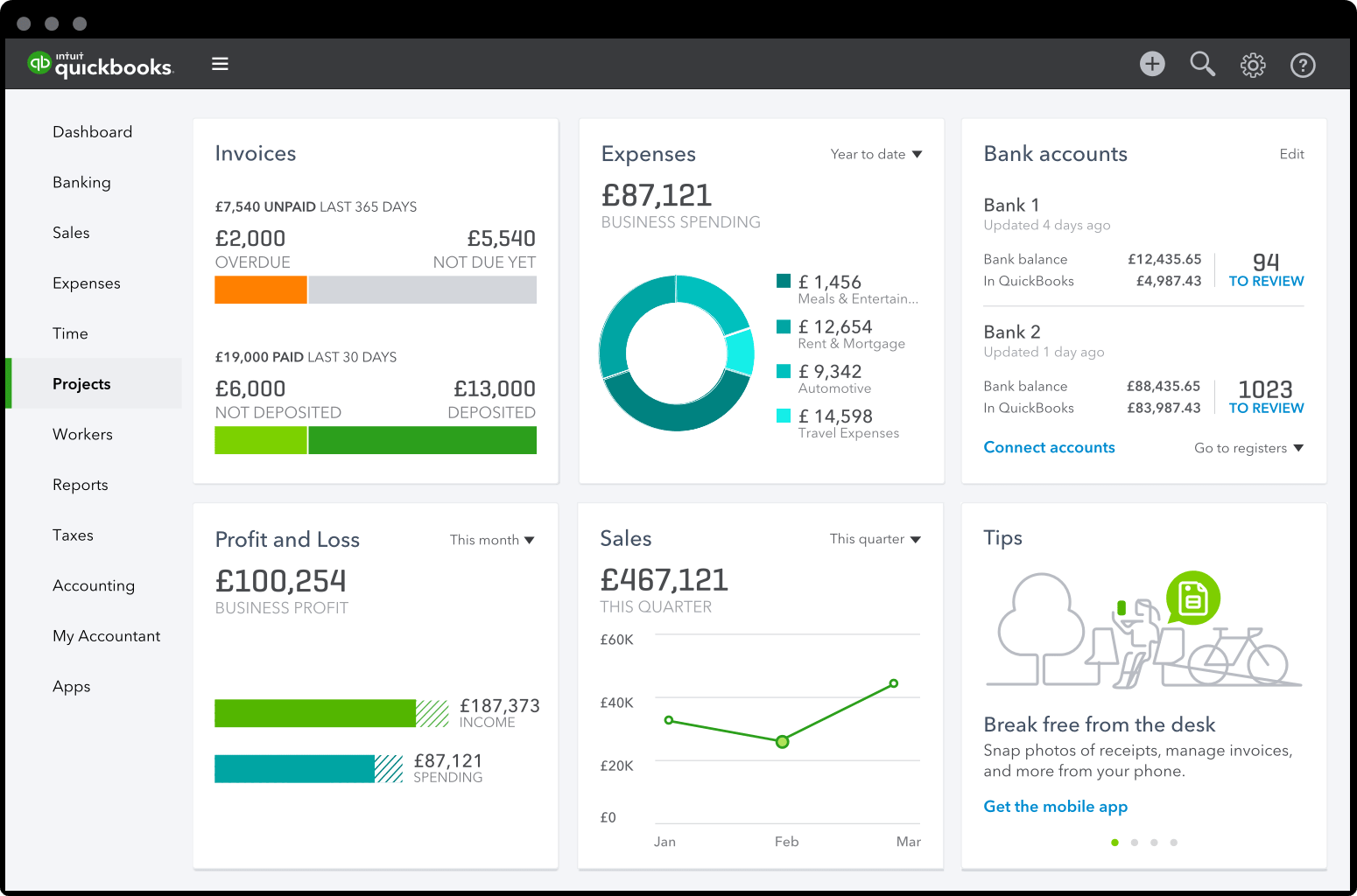
Features
1. User-Friendly Interface QuickBooks, a stalwart in the realm of small business software, boasts a user-friendly interface that simplifies complex accounting processes. The intuitive design ensures that even those with limited accounting knowledge can navigate seamlessly.
2. Cloud-Based Accounting Software Embracing the future, QuickBooks offers a cloud-based accounting solution. This not only facilitates remote access best accounting software but also ensures real-time collaboration among small business teams, promoting efficient workflow.
3. Advanced Features for Financial Reporting From cash flow forecasts to detailed financial reports, QuickBooks equips small business owners with advanced features to gain valuable insights into their business performance. The software goes beyond basic tools, enabling a profound understanding of financial dynamics for small business owner.
4. Seamless Expense Tracking QuickBooks excels in expense tracking, providing an integrated system that allows businesses to monitor and manage expenses effortlessly. This feature is particularly beneficial for maintaining a clear overview of cash flow.
5. Payroll Software Integration For small business owners handling payroll tasks for up to five clients, QuickBooks integrates seamlessly with payroll software, streamlining the process of compensating employees accurately and on time.
FreshBooks: Invoicing and Expense Tracking
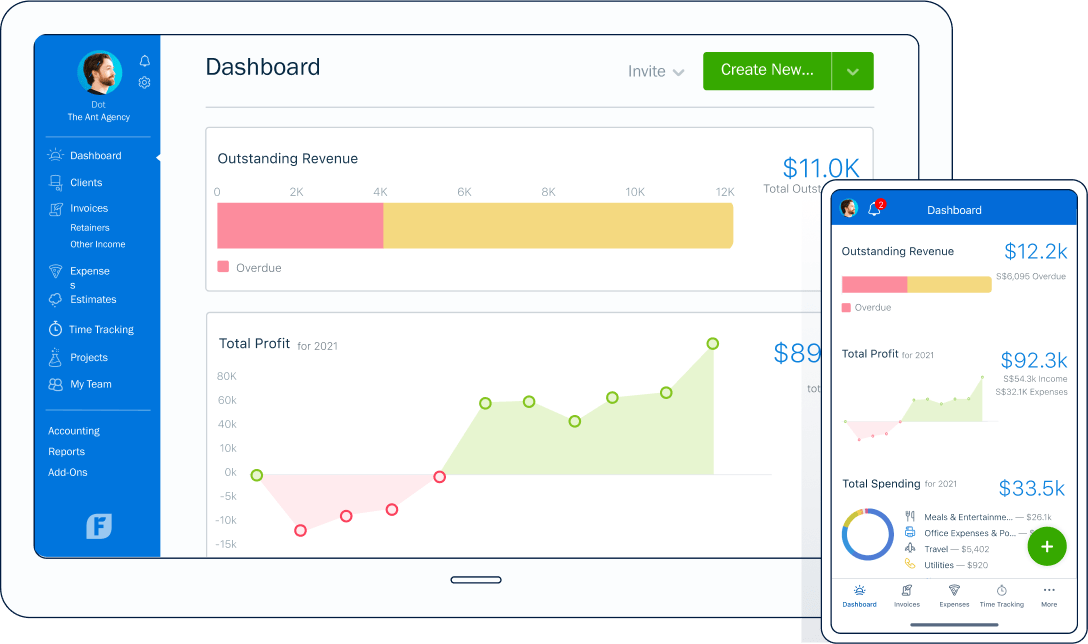
Features
1. Effortless Invoicing FreshBooks specializes in invoicing, offering small business owners a tool that simplifies the billing process. Create professional invoices, track payments, and ensure a smooth cash flow with this dedicated feature.
2. User-Friendly Expense Tracking Similar to QuickBooks, FreshBooks excels in expense tracking. The user-friendly interface allows businesses to categorize and manage expenses efficiently, making financial management less daunting for entrepreneurs.
3. Cloud-Based Collaboration FreshBooks adopts a cloud-based approach for seamless collaboration. This feature is a boon for small business teams spread across various locations, fostering a cohesive working environment.
4. Time Tracking for Productivity For service-based businesses, FreshBooks introduces time tracking tools. Monitor billable hours accurately, optimize productivity, and ensure that client billing reflects the true value of the services provided.
5. Accepting Payments with Ease In the competitive world of small business, timely payments are crucial. FreshBooks integrates smoothly with payment systems, allowing businesses to accept payments seamlessly, enhancing cash flow and financial stability.
Wave: Free Accounting Software with Paid Features
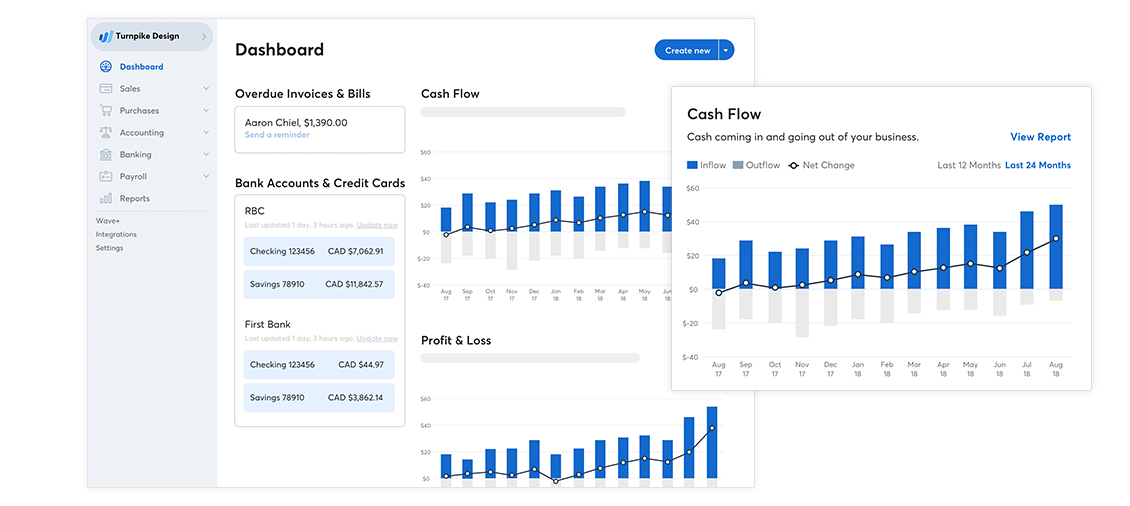
Features
1. Free Accounting Software Wave stands out as a free accounting and tax software solution for small businesses. While offering a solid foundation of basic tools, it also provides businesses the option to opt for additional paid features as they grow.
2. Double Entry Accounting System Wave incorporates a double-entry accounting system, a hallmark of precision in financial management. This ensures that accounting data is recorded accurately, minimizing errors and enhancing the reliability of financial reports.
3. Robust Expense Management With robust expense management features, Wave enables businesses to keep a tight rein on their finances. From tracking everyday expenses to managing complex financial transactions, Wave caters to the diverse needs of small business owners.
4. Cloud Storage for Financial Data The integration of cloud storage within Wave ensures the secure storage of company data. This feature not only enhances accessibility but also safeguards vital financial information against unforeseen events.
5. Custom Pricing for Scalability Understanding the evolving nature of small businesses, Wave offers custom pricing for additional features. This scalability ensures that businesses only pay for the tools they need, making it a cost-effective solution.
Xero: Cloud-Based Accounting and Invoicing
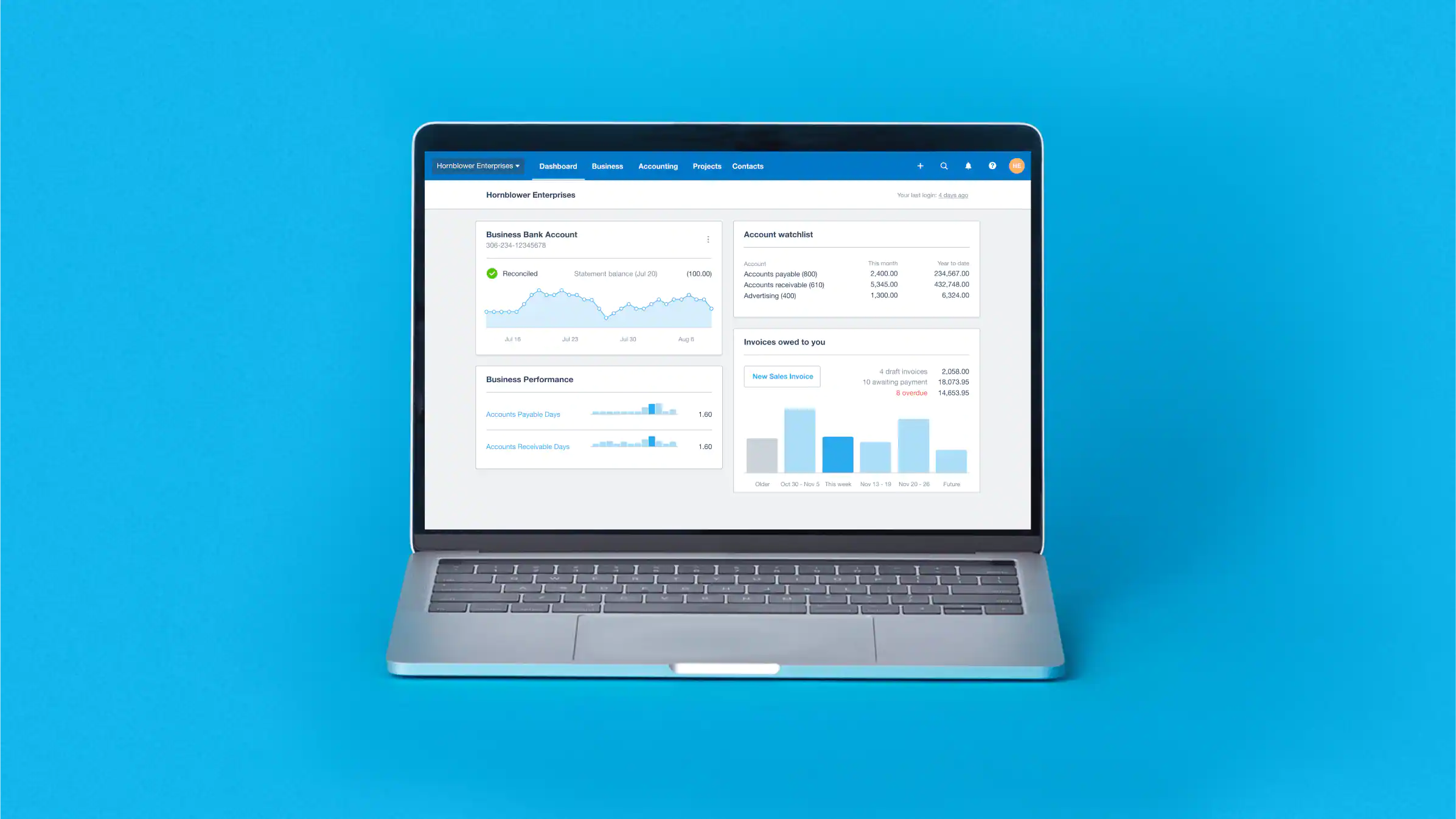
Features
1. Cloud-Based Accounting and Invoicing Xero distinguishes itself by offering a comprehensive cloud-based solution for both accounting and invoicing. The seamless integration of these features provides small business owners with a unified platform for financial management.
2. Efficient Inventory Management For businesses dealing with physical products, Xero provides efficient inventory management tools. Keep track of stock levels, automate reordering processes, and optimize inventory turnover with this valuable feature.
3. Task and Project Management Integration Xero goes beyond traditional accounting software, incorporating task and project management features. This integration ensures that businesses can manage not just finances, but also the entire spectrum of their operations within a single platform.
4. HR Management Software Recognizing the importance of human resources in small businesses, Xero introduces HR management software. From employee data management to payroll processing, this feature streamlines HR tasks, allowing businesses to focus on their core operations.
5. Comprehensive Financial Reporting Xero stands out with its comprehensive financial reporting tools. Generate detailed reports, analyze trends, and make informed decisions based on real-time data. This feature is instrumental in charting the course for long-term business success.
Customer Relationship Management (CRM)
The essence of modern business lies in its ability to forge and maintain meaningful relationships with customers. In an era dominated by digital interactions, the role of Customer Relationship Management (CRM) software becomes paramount.
Salesforce: Scalable CRM Solutions
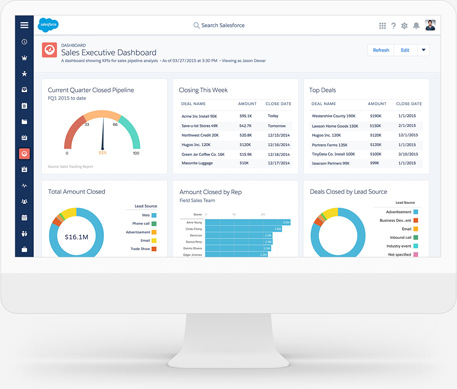
Features
1. Comprehensive Lead Management Salesforce stands as a beacon in the realm of CRM software for small businesses, offering robust lead management capabilities. Harness the power of data-driven insights to identify potential leads and nurture them into loyal customers.
2. Advanced Features for Sales Teams Empower your sales team with advanced features that streamline the sales process. From lead tracking to performance analytics, Salesforce provides a holistic view of sales operations, driving productivity and revenue growth.
3. Cloud-Based Accessibility Embracing the future of business operations, Salesforce offers cloud-based CRM solutions. This ensures real-time access to critical customer data, fostering agility and responsiveness in an ever-evolving market landscape.
4. Customizable Dashboards for Financial Reporting Dive deep into business finances with customizable dashboards designed for comprehensive financial reporting. Monitor key metrics, analyze trends, and make informed decisions to optimize cash flow and drive business performance.
5. Seamless Integration with Other Software Tools Salesforce integrates seamlessly with a myriad of software tools, from accounting software to marketing solutions. This interoperability enhances operational efficiency, enabling businesses to create a cohesive digital ecosystem.
HubSpot: Marketing, Sales, and Service Hub
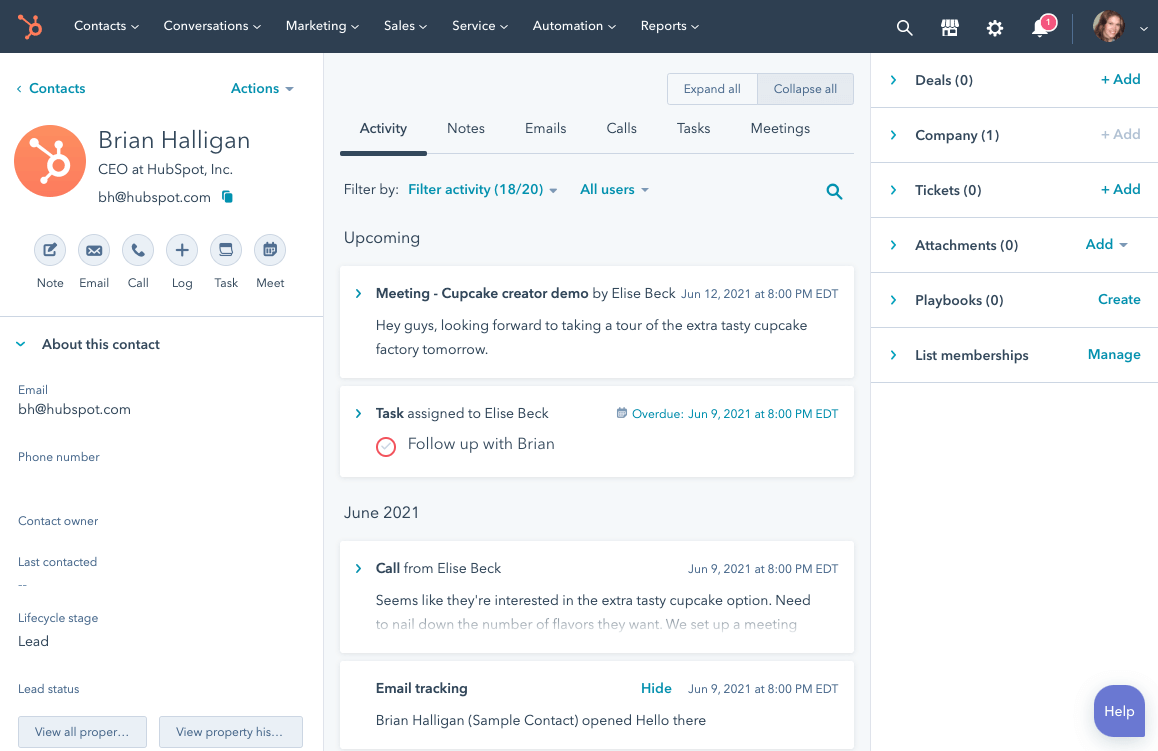
Features
1. All-In-One Marketing Solutions HubSpot transcends traditional CRM boundaries by offering integrated marketing solutions. Craft compelling marketing strategies, automate campaigns, and measure ROI with tools designed for the modern marketer.
2. Sales Automation for Small Businesses Leverage the power of automation to streamline sales processes. HubSpot equips small business teams with tools that automate repetitive tasks, enabling them to focus on building relationships and closing deals.
3. Service Hub for Customer Support Deliver unparalleled customer support with HubSpot’s Service Hub. From ticketing systems to knowledge bases, empower your support teams to resolve queries promptly and enhance customer satisfaction.
4. Comprehensive Analytics for Business Performance Gain invaluable insights into business performance with HubSpot’s comprehensive analytics tools. Track key performance indicators, measure campaign effectiveness, and refine strategies to achieve sustainable growth.
5. Scalable Solutions with Custom Pricing Understanding the unique needs of small businesses, HubSpot offers scalable CRM solutions with custom pricing options. This flexibility ensures that businesses of all sizes can harness the power of HubSpot’s platform without breaking the bank.
Zoho CRM: Customizable and Affordable CRM
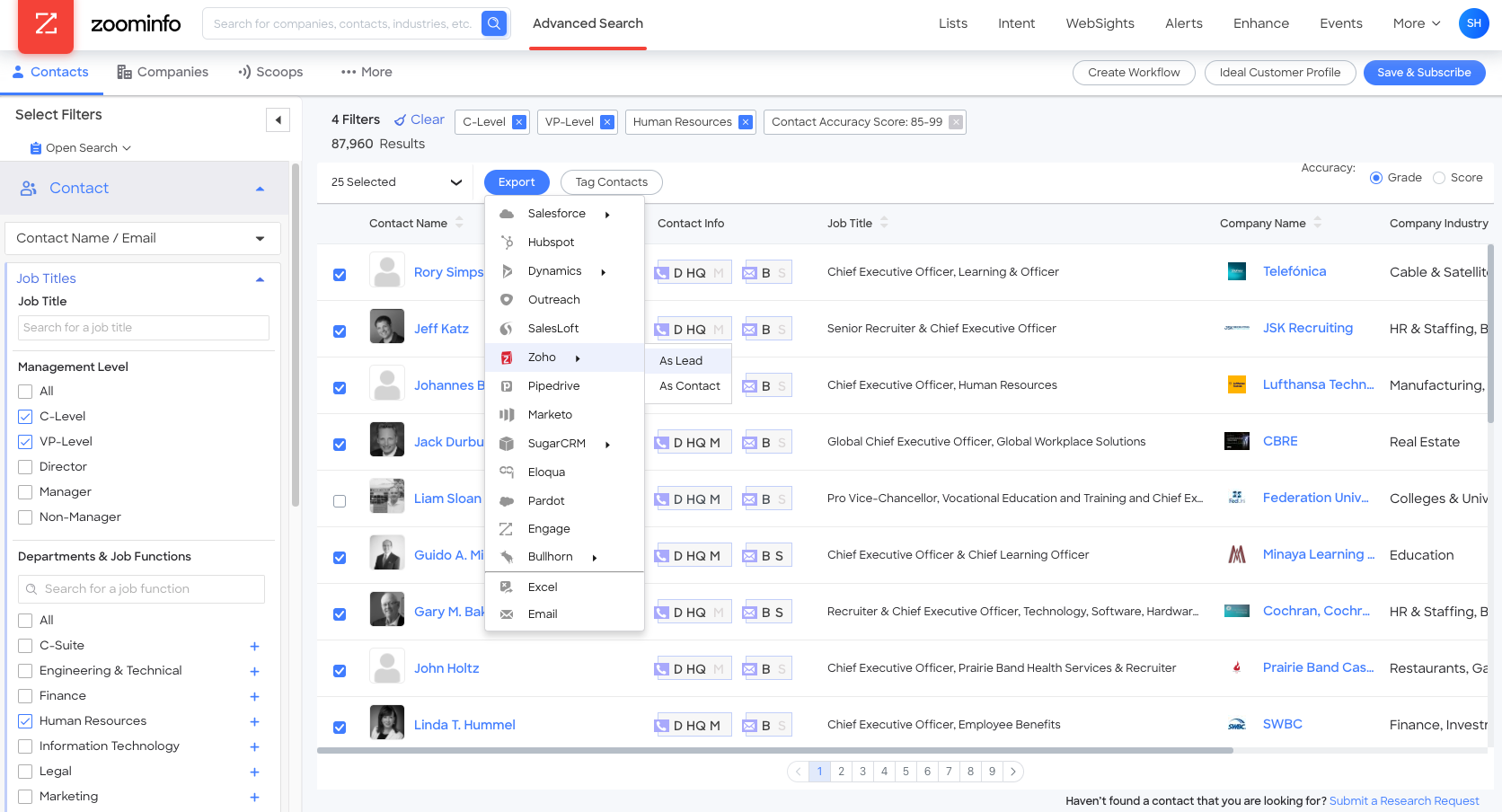
Features
1. Tailored CRM Solutions Zoho CRM prides itself on offering customizable solutions tailored to the unique requirements of small businesses. Whether it’s lead management or customer engagement, Zoho provides tools that align with your business objectives.
2. Affordable Pricing for Small Businesses Recognizing the budget constraints of small business owners, Zoho CRM offers affordable pricing plans without compromising on features. This affordability ensures that even fledgling businesses can access premium CRM functionalities.
3. Integration with Accounting Software Streamline accounting tasks by integrating Zoho CRM with accounting software tailored for small businesses. This seamless integration facilitates smooth financial operations, from expense tracking to cash flow management.
4. Collaboration Tools for Team Collaboration Foster a culture of collaboration with Zoho CRM’s integrated collaboration tools. Empower your small business teams to work cohesively, share insights, and drive collective success.
5. Cloud Storage for Secure Data Management Safeguard critical company data with Zoho CRM’s cloud storage solutions. Benefit from secure and scalable storage options that ensure data integrity and compliance with industry regulations.
Pipedrive: Sales Pipeline Management
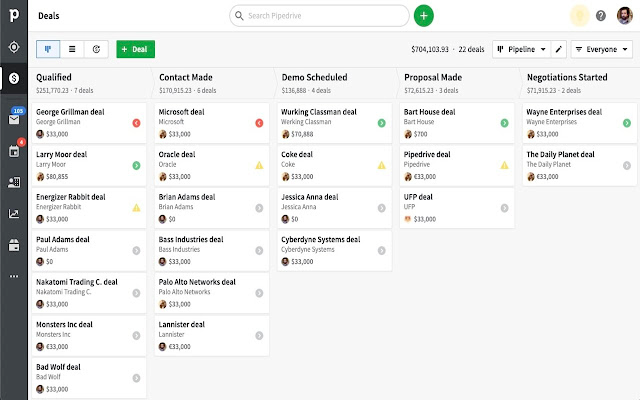
Features
1. Intuitive Sales Pipeline Management Pipedrive excels in providing intuitive sales pipeline management tools designed to enhance sales efficiency. Visualize sales processes, track deals, and prioritize activities to accelerate sales cycles and boost revenue.
2. Time Tracking for Productivity Optimize productivity with Pipedrive’s time tracking and productivity tools. Monitor sales activities, analyze time allocation, and identify opportunities for process optimization to drive business performance.
3. Lead Scoring for Targeted Engagement Harness the power of lead scoring to prioritize engagements and tailor outreach strategies. Pipedrive’s lead scoring algorithms enable businesses to focus on high-value prospects, maximizing conversion rates and ROI.
4. Seamless Integration with Marketing Software Integrate Pipedrive with marketing software to create a cohesive sales and marketing ecosystem. This seamless integration enhances lead management, fosters alignment between teams, and drives coordinated efforts towards achieving business objectives.
5. Mobile Accessibility for On-the-Go Sales Teams Empower on-the-go sales teams with Pipedrive’s mobile accessibility features. Access critical sales data, manage leads, and collaborate with team members anytime, anywhere, ensuring responsiveness and agility in a fast-paced business environment.
Human Resources and Inventory: Streamlining Business Operations
In the intricate tapestry of business operations, human resources and inventory management emerge as pivotal threads. The seamless integration of these facets ensures operational efficiency, fostering growth and sustainability.
TradeGecko: Inventory and Order Management
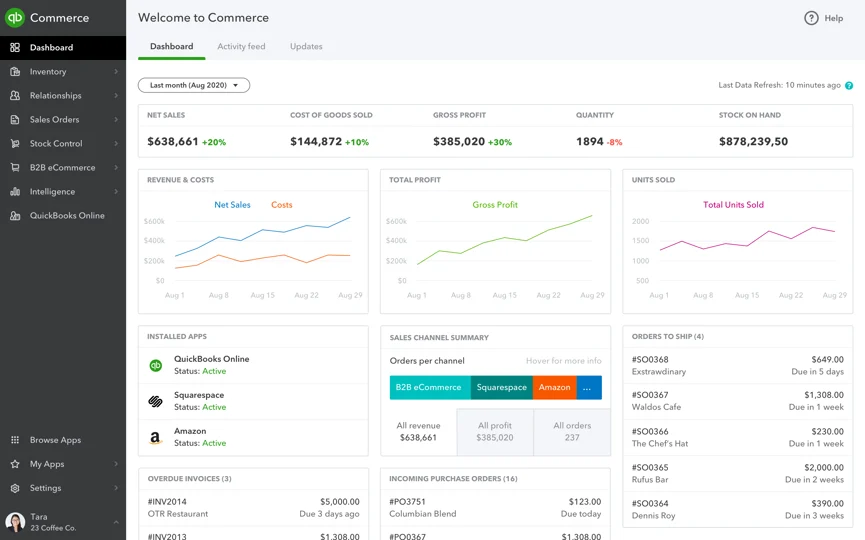
Features
1. Comprehensive Inventory Management TradeGecko stands as a beacon in the realm of inventory management, offering small businesses robust tools to streamline inventory operations. From stock level monitoring to order fulfillment, TradeGecko empowers businesses to maintain optimal inventory levels, enhancing customer satisfaction and operational efficiency.
2. Order Management for Seamless Transactions Facilitate seamless transactions with TradeGecko’s advanced order management capabilities. From order creation to delivery, the platform offers tools that ensure accuracy and timeliness, bolstering the trust and loyalty of customers.
3. Integration with Accounting Software Ensure synchronization between inventory and other accounting software data with TradeGecko’s seamless integration capabilities. This interoperability facilitates real-time financial reporting, enabling businesses to make informed decisions based on accurate data.
4. Cloud-Based Accessibility for Remote Operations Embrace the flexibility of remote operations with TradeGecko’s cloud-based inventory management solutions. Access critical inventory data anytime, anywhere, fostering agility and responsiveness in an ever-evolving market landscape.
5. Advanced Features for Business Performance Analysis Leverage TradeGecko’s advanced analytics tools to gain insights into business performance. Monitor key performance indicators, analyze trends, and identify opportunities for optimization, driving sustainable growth and profitability.
Cin7: Inventory and Warehouse Management
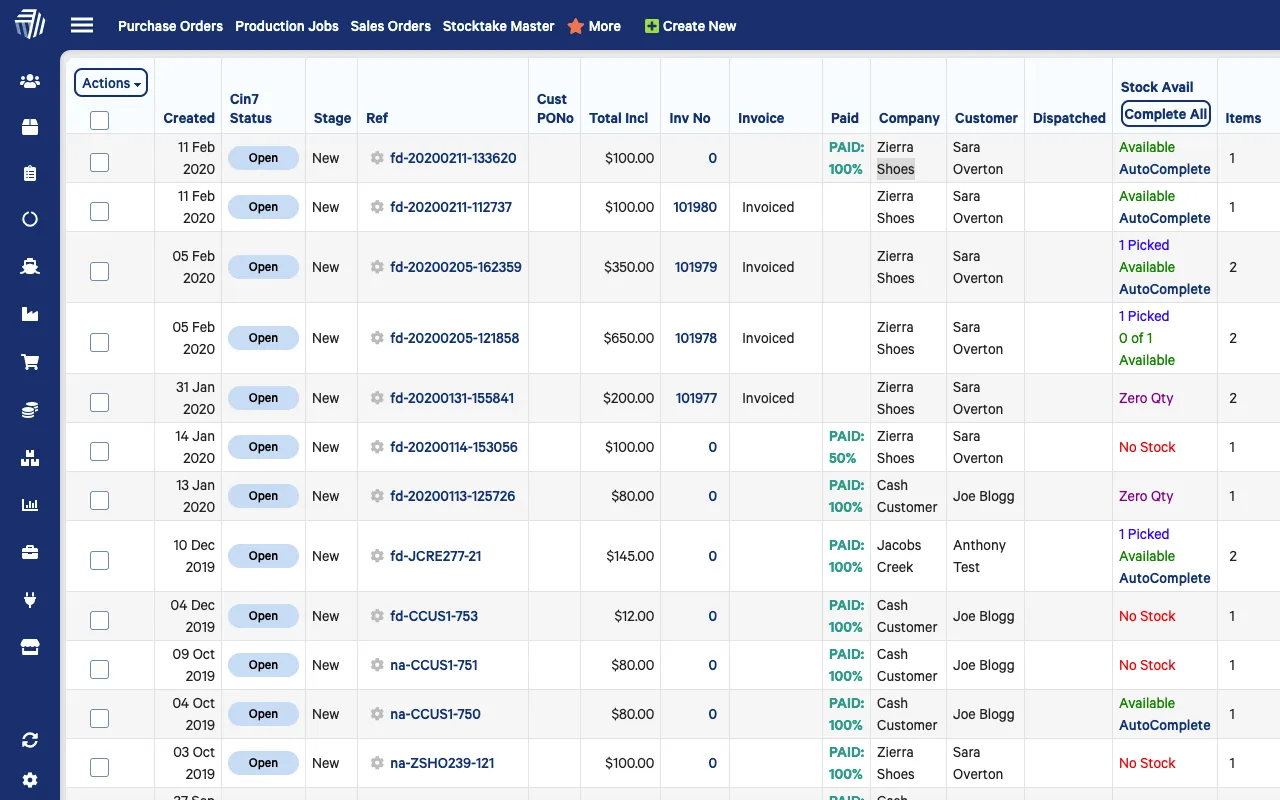
Features
1. Integrated Inventory and Warehouse Management Cin7 offers a holistic approach to inventory management, seamlessly integrating warehouse operations with inventory control. This integration ensures optimal stock levels, efficient warehouse utilization, and timely order fulfillment, enhancing overall business efficiency.
2. Multi-Channel Sales Integration Facilitate sales across multiple channels with Cin7’s integrated sales solutions. From online platforms to physical stores, the platform offers tools that synchronize sales data, ensuring consistency and accuracy across all channels.
3. Real-Time Inventory Tracking for Enhanced Visibility Gain unparalleled visibility into inventory operations with Cin7’s real-time tracking capabilities. Monitor stock levels, track inventory movements, and manage replenishment processes with precision, minimizing stockouts and overstock situations.
4. Customizable Reporting for Informed Decision-Making Harness the power of data with Cin7’s customizable reporting tools. Generate detailed reports, analyze performance metrics, and derive actionable insights to optimize inventory strategies and drive business growth.
5. Scalable Solutions for Growing Businesses Cin7 offers scalable inventory management solutions designed to accommodate the evolving needs of growing businesses. Whether it’s expanding product lines or entering new markets, Cin7 provides the flexibility and scalability to support business expansion seamlessly.
BambooHR: HR Software for Small and Medium Businesses
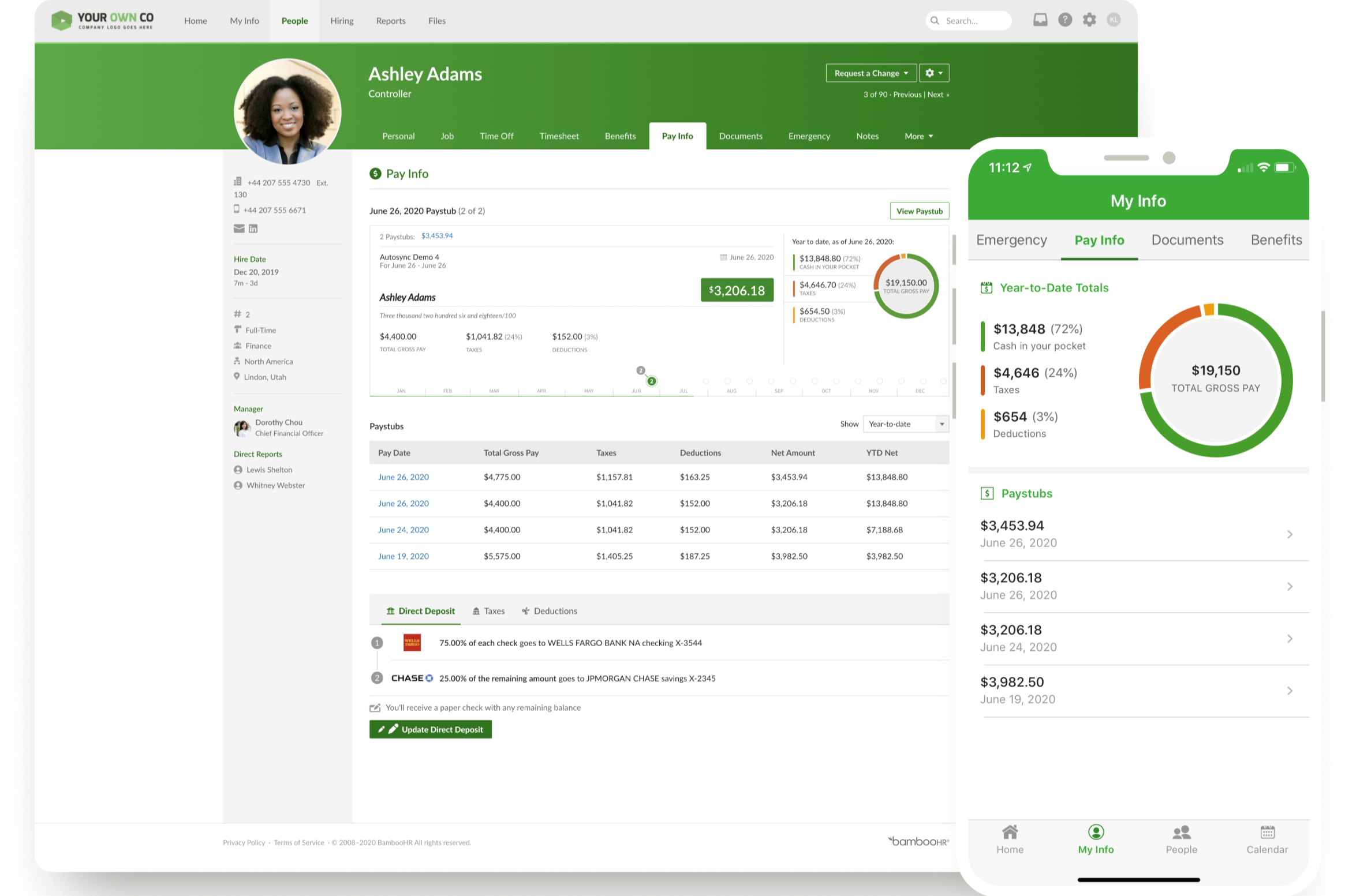
Features
1. Comprehensive HR Management BambooHR offers a comprehensive suite of HR management tools tailored for small and medium businesses. From employee onboarding to performance evaluation, the platform streamlines HR processes, fostering a conducive work environment and driving employee engagement.
2. Time Tracking and Attendance Management Optimize workforce management with BambooHR’s time tracking and attendance management tools. Monitor employee hours, manage shifts, and automate payroll processes with precision, ensuring compliance and accuracy in HR operations.
3. Employee Self-Service Portals for Enhanced Accessibility Empower employees with self-service portals that facilitate seamless access to HR information and resources. From viewing pay stubs to updating personal information, BambooHR’s self-service portals enhance employee autonomy, fostering satisfaction and productivity.
4. Advanced Analytics for Talent Management Leverage BambooHR’s advanced analytics tools to gain insights into talent management practices. Monitor employee performance, identify training needs, and implement strategies to nurture talent and drive organizational growth.
5. Cloud-Based Accessibility for Remote Workforces Embrace the digital transformation with BambooHR’s cloud-based HR solutions. Facilitate seamless communication and collaboration among remote workforces, fostering a cohesive organizational culture and driving business success.
Workday: Unified Human Capital Management
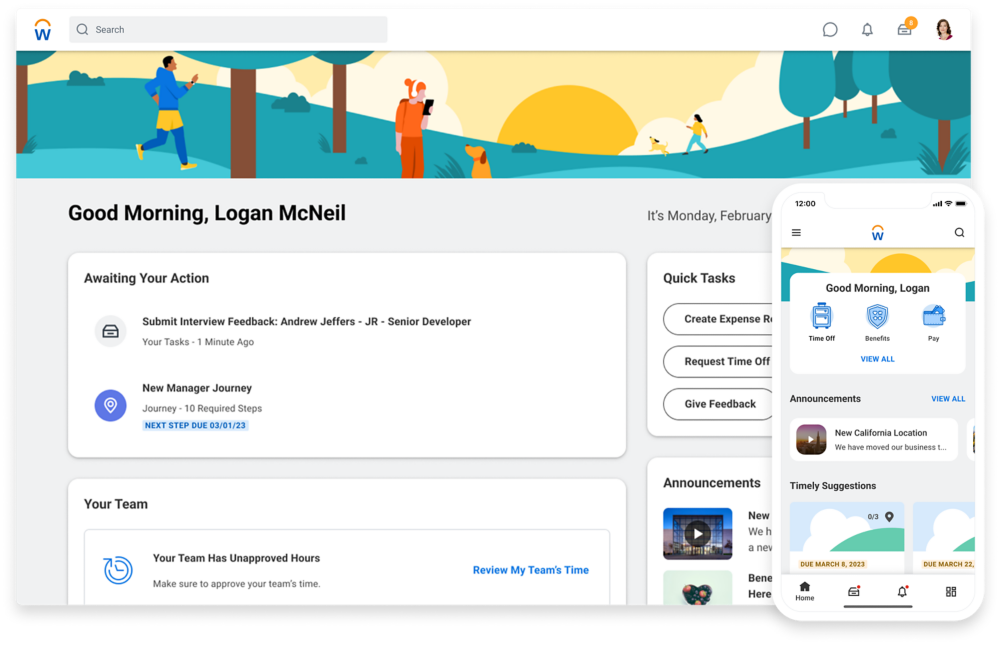
Features
1. Unified Human Capital Management Workday offers a unified platform for human capital management, encompassing a myriad of HR functions from talent acquisition to workforce planning. This integration ensures alignment between HR strategies and organizational goals, fostering a culture of excellence and innovation.
2. Talent Optimization for Business Growth Harness the power of data-driven insights with Workday’s talent optimization tools. Identify high-potential employees, nurture leadership capabilities, and implement succession planning strategies to drive business growth and sustainability.
3. Compliance Management for Risk Mitigation Ensure compliance with regulatory requirements and industry standards with Workday’s comprehensive compliance management tools. From employee data privacy to labor laws, the platform offers solutions that mitigate risks and safeguard organizational reputation.
4. Personalized Employee Experiences for Enhanced Engagement Foster employee engagement and satisfaction with Workday’s personalized HR solutions. Tailor experiences based on individual preferences and career aspirations, fostering a conducive work environment that nurtures talent and drives performance.
5. Scalable Solutions for Enterprise-Level Operations Workday offers scalable human capital management solutions designed to accommodate the complex needs of large enterprises. Whether it’s managing global workforces or implementing complex HR policies, Workday provides the flexibility and scalability to support organizational growth and transformation.
How to Choose the Right Software for Your Business

With numerous software options available, choosing the right one for your small business can be overwhelming. Here are some key considerations to help you make an informed decision.
When it comes to selecting software for your business, it’s essential to assess your specific needs. Start by evaluating your business processes and identifying the tasks that can benefit from software automation. Are there areas where you can improve efficiency, reduce costs, or enhance customer experience? By pinpointing these areas, you can narrow down your options and choose software that aligns with your goals.
Once you’ve identified your business needs, it’s time to research and compare different software options. Take advantage of free trials or demos offered by software providers. This will allow you to test the user interface, explore features, and assess ease of use. Additionally, reading customer reviews and seeking recommendations from other small business owners can provide valuable insights into the software’s performance and reliability.
When considering software for your small business, budget is an important factor to take into account. Determine an appropriate budget range based on your business size and industry. Keep in mind that investing in software is an investment in the future of your business. Consider the return on investment (ROI) the software can provide. Evaluate the potential benefits and savings it can generate in the long run, weighing them against the initial cost.
Furthermore, it’s crucial to consider the scalability of the software. As your business grows, will the software be able to accommodate your expanding needs? Look for software that can adapt and scale with your business to avoid the hassle of switching to a new system in the future.
Another aspect to consider is the level of technical support provided by the software provider. Will they offer assistance during the implementation process? What kind of customer support do they provide? Having reliable technical support can make a significant difference in your experience with the software.
Lastly, don’t forget to take into consideration the compatibility of the software with your existing systems and infrastructure. Ensure that the software can seamlessly integrate with your current tools and platforms to avoid any disruptions or compatibility issues.
By carefully assessing your best small business software needs, comparing software options, considering budget and ROI, evaluating scalability, and ensuring compatibility, you can make an informed decision when choosing the right software for your small business.
Implementing Software in Your Small Business

Implementing software successfully is crucial for maximizing its benefits. Here are some key steps to consider.
When it comes to implementing software in your small business, there are several factors to take into account. It’s not just about installing the software and hoping for the best. Proper planning and execution are essential for a smooth transition and optimal results.
One of the first steps to consider is training and support. It’s important to ensure that your employees receive proper training on using the software effectively. This will help them understand its functionalities and make the most out of it. Some software providers offer training resources or videos to help users get started. Taking advantage of these resources can significantly enhance your team’s proficiency with the software.
In addition to training, it’s crucial to prioritize software vendors that provide reliable technical support. No matter how well-prepared your team is, there may be instances where they encounter issues or have questions during the implementation process. Having access to reliable technical support can make a significant difference in resolving these challenges promptly and efficiently.
Once the software is implemented, it’s essential to regularly evaluate its performance and impact on your business operations. Setting key performance indicators (KPIs) related to efficiency, cost savings, or customer satisfaction can help you measure the software’s effectiveness. Tracking your progress against these KPIs will allow you to identify areas for improvement and make necessary adjustments to maximize the benefits.
Moreover, it’s important to stay updated with software updates and advancements. Technology is constantly evolving, and software vendors often release updates to address bugs, enhance functionality, or introduce new features. Keeping your software up to date ensures that you are taking advantage of the latest improvements and optimizations.
Implementing software in your small business is not a one-time task. It requires ongoing monitoring, evaluation, and adaptation to ensure that it continues to meet your business needs effectively. By following these steps and staying proactive, you can make the most out of your software investment and drive your business forward.
Evaluating Software Performance and Impact
Regularly evaluate the performance and impact of the software on your business operations. Set key performance indicators (KPIs) related to efficiency, cost savings, or customer satisfaction, and track your progress. Adjust processes or seek software updates to maximize the benefits and address any challenges that may arise.
When evaluating the performance of the software, it’s important to consider various factors. Look at how the software has improved efficiency within your business. Has it streamlined processes, reduced manual work, or eliminated bottlenecks? Assessing the impact on efficiency can help you determine the software’s effectiveness in optimizing your operations.
Cost savings are another crucial aspect to evaluate. Has the software helped you save money in any way? Perhaps it has reduced the need for additional staff, eliminated the use of expensive third-party tools, or improved inventory management, leading to reduced waste. Understanding the financial impact of the software can provide valuable insights into its value for your business.
Customer satisfaction is also a key metric to consider. Has the software improved your ability to serve your customers? Has it enhanced communication, allowed for quicker response times, or provided a more personalized experience? Evaluating customer satisfaction can help you gauge the software’s impact on your overall business performance and reputation.
Based on your evaluation, you may identify areas where the software can be further optimized. This could involve adjusting processes, providing additional training to employees, or seeking free software updates from the vendor. By actively addressing any challenges or limitations, you can ensure that the software continues to deliver maximum benefits to your small business.
Future Trends in Business Software

The world of business software is constantly evolving. Here are some future trends that can shape small business software solutions and the way small businesses operate.
The Rise of AI and Machine Learning in Business Software
Artificial Intelligence (AI) and Machine Learning (ML) are transforming the way businesses operate. From automated customer service chatbots to predictive analytics, AI-powered software can provide valuable insights and streamline decision-making processes. Small businesses can leverage AI and ML to gain a competitive edge and enhance efficiency.
The Shift Towards Cloud-Based Software Solutions
Cloud-based software solutions are gaining popularity due to their flexibility and accessibility. With cloud-based software, small businesses can access their data and applications from anywhere, eliminating the need for expensive on-premises infrastructure. Cloud solutions also offer scalability, data security, and cost savings, making them an attractive choice for small businesses.
Software has become an integral part of running a successful small business. By understanding the importance of software for small business, reviewing top software categories, considering different factors when choosing software, implementing it effectively, and keeping an eye on future trends, small businesses can leverage technology to thrive in today’s competitive landscape.






